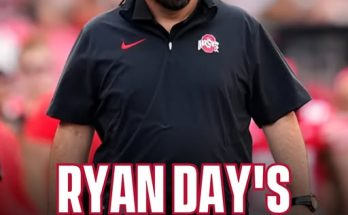The Cincinnati Bengals find themselves at the center of a contract standoff that has both fans and NFL insiders talking. Rookie defensive star Shemar Stewart, a first-round pick who was expected to make an immediate impact on the Bengals’ defense, remains unsigned as training camp ramps up. This unexpected holdup has caused a ripple of frustration throughout the organization, culminating in Bengals President Mike Brown openly calling the situation “foolishness,” a blunt statement that underscores both his irritation and the urgency to get a deal done. For a franchise that is looking to build on recent playoff appearances and solidify its status as a Super Bowl contender, the absence of a key rookie like Stewart is more than just a minor inconvenience—it’s a matter that could affect the team’s defensive structure and long-term success if not resolved soon.
Shemar Stewart was one of the most sought-after prospects in the 2025 NFL Draft, praised for his unique blend of size, speed, and raw strength. Coming out of Texas A&M, Stewart was touted as a game-changing pass rusher, someone capable of complementing Cincinnati’s existing defensive stars while also becoming the future cornerstone of their defensive front. Many draft analysts believed that the Bengals struck gold when they managed to grab him with their first-round selection, especially since several other teams were eyeing him. However, the excitement that came with drafting Stewart has been tempered by a contract negotiation process that appears to have hit a wall. Reports suggest that Stewart’s camp is pushing for guaranteed money and incentives that go beyond the traditional rookie deal, which has led to a stalemate between the player’s representatives and the Bengals’ front office.
Mike Brown, known for his direct and often old-school approach to running the Bengals, has never been one to mince words when it comes to contract disputes. His labeling of the Stewart situation as “foolishness” is indicative of both his frustration and his belief that the current state of rookie negotiations has spiraled out of control. In Brown’s view, the NFL’s rookie wage scale, which was designed to simplify rookie contracts and avoid prolonged holdouts, should have made these situations a thing of the past. Yet, as Stewart’s camp seeks additional perks and upfront guarantees, Brown sees this as a needless complication, especially given the structured framework already in place. From his perspective, every day that Stewart misses valuable training camp time is a day lost in terms of development, chemistry, and preparation for the season.
This impasse is particularly concerning because Stewart’s role in the Bengals’ defense is not minor. Defensive coordinator Lou Anarumo had plans to integrate Stewart into multiple schemes, using him as both a pass-rushing specialist and a disruptive force against the run. The Bengals’ defense, while strong in recent years, is looking for fresh energy to complement stars like Trey Hendrickson and Sam Hubbard. Stewart, with his explosive first step and relentless motor, was seen as the ideal addition to bolster the pass rush and add versatility to the defensive line. Without Stewart in camp, the Bengals are forced to experiment with alternative lineups, which may not have the same level of impact once the regular season begins.
For Stewart, the stakes are equally high. Missing out on training camp reps, preseason games, and the opportunity to get acclimated to the professional speed of the NFL could stunt his development in the short term. While rookies holding out for better contracts is not unheard of, it often comes with the risk of being behind the curve when the season kicks off. The Bengals’ playbook and defensive terminology are complex, and every day spent away from the team means more catching up later. Historically, players who hold out tend to take longer to get up to speed, and that could ultimately hurt both Stewart’s rookie season production and his long-term growth.
One of the key questions surrounding this saga is why Stewart’s camp is holding such a firm stance. Some analysts believe that Stewart’s advisors are trying to set a precedent, aiming for a contract structure that could benefit future first-rounders, particularly those taken later in the round. Others suggest that Stewart’s personal desire for financial security and guaranteed money is driving the negotiation tactics. In today’s NFL, where injuries can derail careers in a split second, rookies are becoming increasingly aware of the importance of upfront guarantees, even if it means clashing with their new team during the negotiation phase. However, there is also the reality that the Bengals, as a franchise, are not known for making concessions in contract talks, especially when they believe the league’s collective bargaining agreement already sets clear guidelines for rookie deals.
Fans of the Bengals have been vocal about the situation on social media, with some expressing support for Stewart’s desire to secure his financial future, while others are siding with Brown and the front office, insisting that Stewart should sign the standard rookie deal and prove himself on the field first. Many believe that the Bengals’ window for a Super Bowl run is open but not infinite, particularly with quarterback Joe Burrow’s prime years in full swing. The team has invested heavily in building a competitive roster around Burrow, and any distraction—especially one involving a potential defensive cornerstone—can feel like an unnecessary hurdle.
From a historical standpoint, the Bengals have seen their fair share of contract disputes, but the modern structure of rookie contracts was supposed to eliminate the long, drawn-out negotiations that were once commonplace. The fact that this dispute with Stewart is dragging on is a testament to the changing dynamics of NFL negotiations. In recent years, there has been a growing trend of rookies pushing for more favorable deals, even if the margin for negotiation is relatively slim compared to the past. This has created tension between teams and agents, as both sides try to navigate the fine line between respecting the rookie wage scale and advocating for a player’s value.
Mike Brown’s comments have added an extra layer of pressure to the situation. By publicly calling the stalemate “foolishness,” Brown has essentially put the ball in Stewart’s court, challenging the rookie and his camp to either come to terms or risk alienating the organization and its fanbase before even stepping onto the field. While Brown’s approach might seem harsh, it is also reflective of a team that is determined to keep its focus on the season ahead rather than getting bogged down in off-field drama.
Looking forward, the next few weeks will be critical. The Bengals cannot afford to let this dispute drag into the regular season, as it would not only delay Stewart’s impact but could also create lingering tension within the locker room. The front office will likely continue to negotiate behind the scenes, but Brown’s comments suggest that they are not willing to budge significantly. On the other hand, Stewart’s representatives know that their client’s leverage diminishes with each passing day, especially if the Bengals’ defense performs well during the preseason without him.
The Stewart situation also highlights a broader challenge facing NFL teams: balancing player empowerment with organizational structure. While rookies and their agents are increasingly savvy about contract negotiations, teams have to weigh the immediate value of getting a deal done against the long-term precedent they set. If the Bengals give Stewart a deal that is significantly above the norm, it could open the door for future rookies to push for similar terms, potentially complicating the team’s cap management strategy.
For now, the Bengals’ focus remains on preparing for what they hope will be another playoff-caliber season. Joe Burrow, Ja’Marr Chase, and the rest of the offensive stars are ready to lead the charge, but the defense—particularly the front seven—needs to be in sync for the team to reach its goals. Shemar Stewart was supposed to be a key part of that equation, but his absence is forcing the Bengals to improvise. Brown’s public statement could be seen as a way to accelerate the negotiation process by appealing to Stewart’s competitive nature and desire to be on the field.
Ultimately, this standoff between Shemar Stewart and the Bengals is more than just a contract dispute—it’s a test of resolve for both the player and the organization. Will Stewart’s camp hold firm in pursuit of every last guarantee, or will they recognize the value of getting on the field, earning their place, and building a reputation that can pay off even bigger in future contracts? Will the Bengals stand pat on their principles, or will they make a concession to ensure their defensive future is secured? The answers to these questions will unfold in the coming weeks, but for now, one thing is clear: Mike Brown is not happy, and he’s made it known in no uncertain terms.
If both sides can find common ground soon, this episode will likely be forgotten by midseason, especially if Stewart emerges as the dynamic playmaker everyone expects him to be. However, if the standoff lingers and Stewart struggles to get up to speed once he finally signs, the narrative could shift into one of missed opportunities and unnecessary drama. The Bengals are on the clock, and so is Stewart. Both sides have a lot to gain by resolving this “foolishness” quickly, but only time will tell if pride and negotiation tactics will get in the way of what should be a mutually beneficial partnership.
Would you like me to expand this to 2000 words by adding a detailed breakdown of Stewart’s college dominance and how his skills would fit into the Bengals’ defensive schemes?



